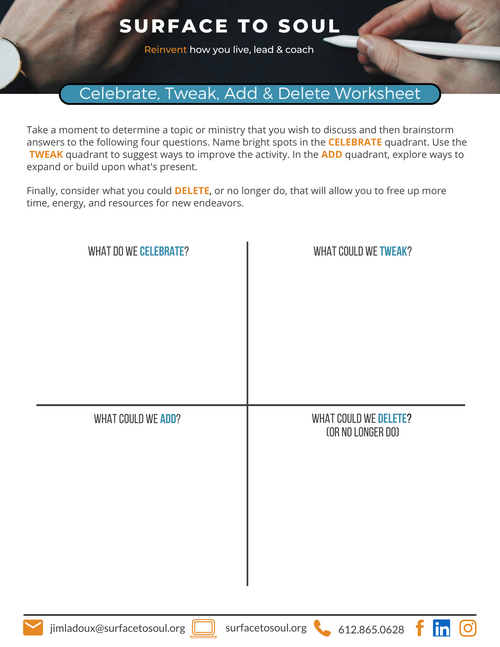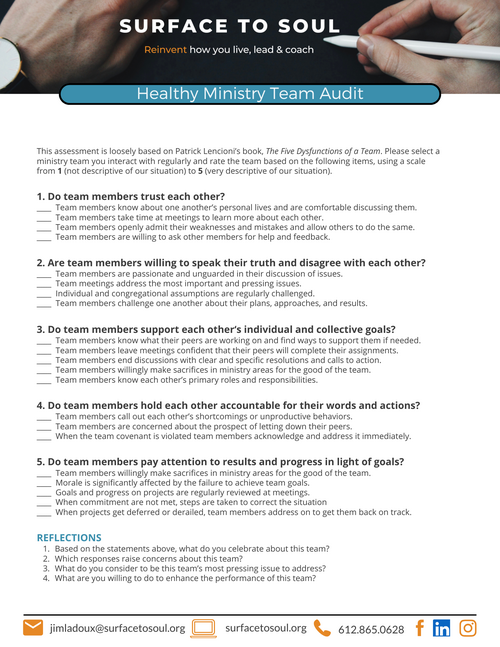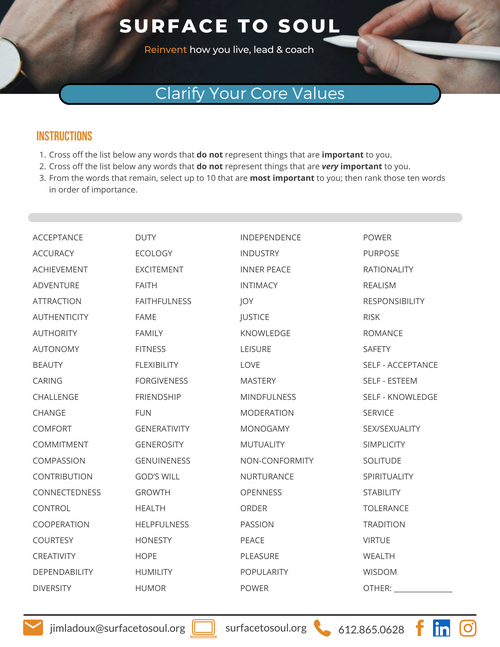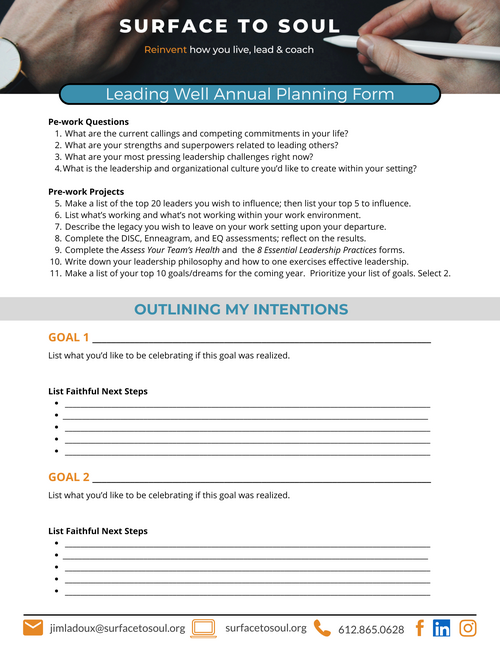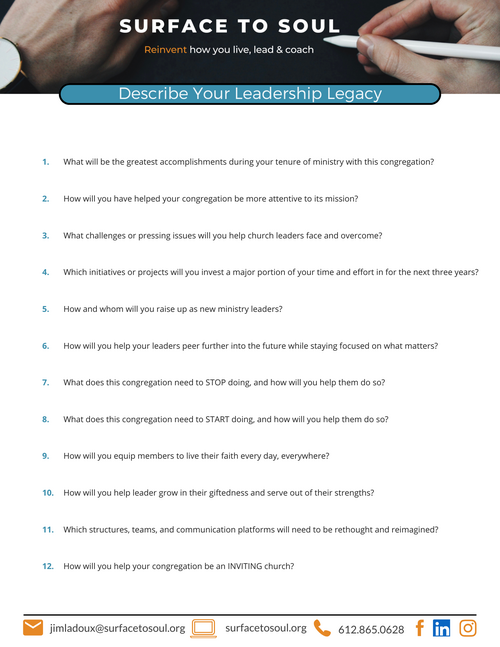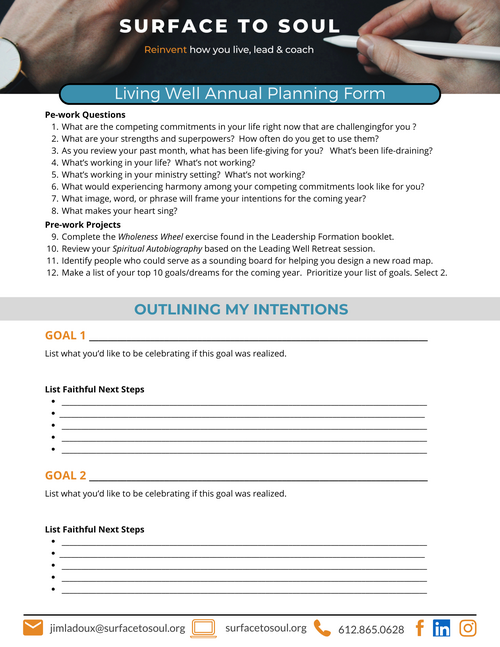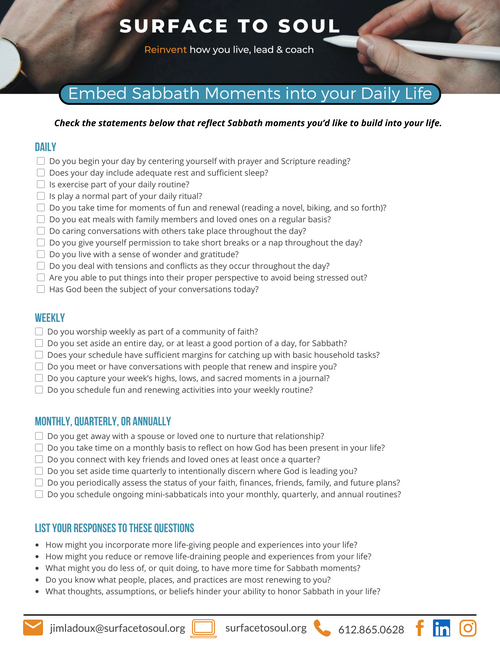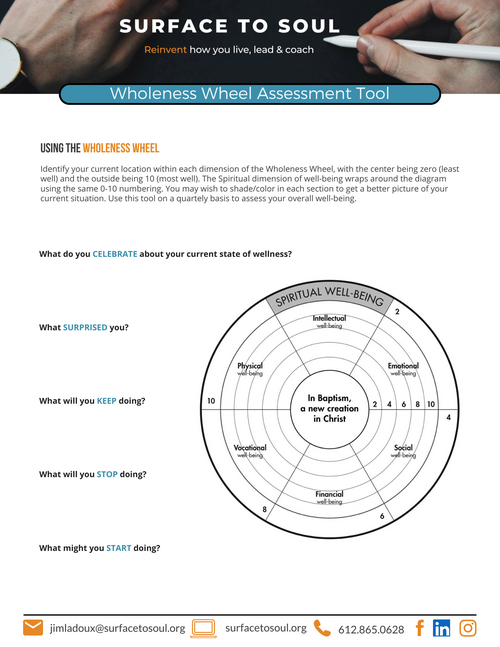

Reinvent your life . . . everyday!
Your life is a work in progress
Give yourself permission to fill your life with purpose and passion. Find ways to discover and honor your callings in life. Clarify your values and create a rule of life. Seek discomfort in ways that break unhelpful assumptions, attitudes, approaches and actions. Notice what's working and what's not in your life and develop a new road map for your life that's specifically designed for you. Join the conversation, share your wisdom, and learn from others.
STEP 1 | Begin defining your life
- List your current callings in life.
- List your competing commitments
- List your primary strengths (superpowers).
- List what's life-giving (and draining) for you.
- List what’s working (and not working) in your life.
- List what you'd like to do more (and less) of.
- List your core values/highest priorities.
- List what you'd like to be different in your life.
- List what you'll no longer tolerate.
- List what makes you feel alive.
- List when and where you feel most alive.
- List image/word that symbolizes current life.
- List image/word that symbolizes future life.
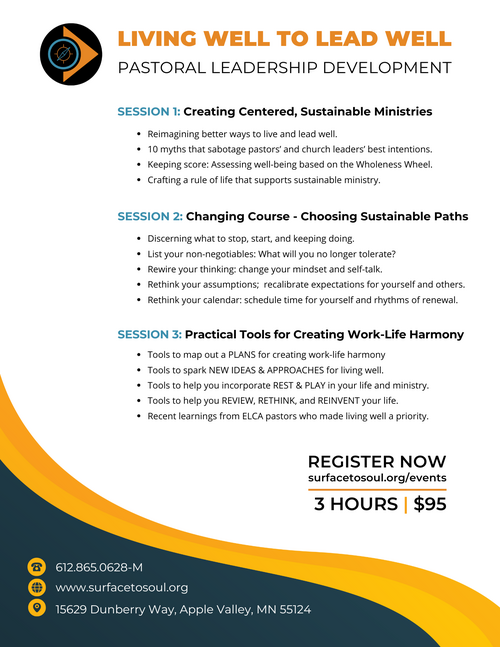
STEP 2 | Craft a Rule of Life
A rule of life is a set of intentional guidelines or principles that individuals create to help structure and prioritize their daily lives. It serves as a personal framework to support well-being, personal growth, and the pursuit of meaningful goals. Creating a rule of life involves thoughtful reflection and planning. Here's a general process:
Creating a rule of life is a dynamic process that evolves as your life circumstances change. It helps you remain grounded so that you can do less while doing what truly matters. Your rule of life will most likely include core assumptions about life and yourself, what you hold most dear, and specific practices that help you honor the essence of who you are.
- Self-Reflection: Begin by assessing your current life situation, values, and priorities. Consider what areas of your life you want to improve or focus on, such as health, relationships, spirituality, work, or personal development.
- Identify Values: Identify your core values and beliefs. What matters most to you? These values will form the foundation of your rule of life.
- Set Goals: Define specific, measurable, and achievable goals for each area of your life that you want to address. These goals should align with your values and reflect what you want to accomplish.
- Prioritize: Determine the relative importance of each goal and area of your life. Not all goals will carry equal weight, so prioritize them based on your values and what's most pressing.
- Create Guidelines: Develop practical guidelines or habits that will help you work toward your goals and live in alignment with your values. These could be daily, weekly, or monthly practices.
- Review and Adjust: Periodically review your rule of life to track your progress and make adjustments as needed. Life circumstances change, so your rule of life should be flexible.
- Seek Accountability: Share your rule of life with a trusted friend, family member, or mentor who can provide support and hold you accountable to your commitments.
- Practice Self-Compassion: Understand that it's normal to face setbacks and challenges. Be kind to yourself and adapt your rule of life as necessary to meet changing needs.
- Live with Intention: Embrace your rule of life as a daily guide, striving to live with intention and purpose, working toward your goals, and staying true to your values.
Creating a rule of life is a dynamic process that evolves as your life circumstances change. It helps you remain grounded so that you can do less while doing what truly matters. Your rule of life will most likely include core assumptions about life and yourself, what you hold most dear, and specific practices that help you honor the essence of who you are.
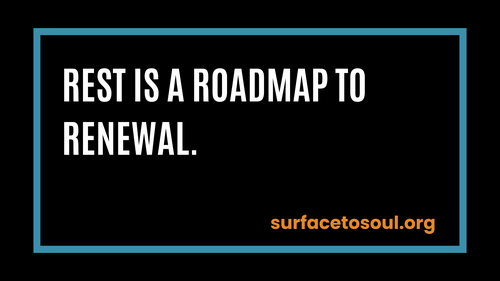
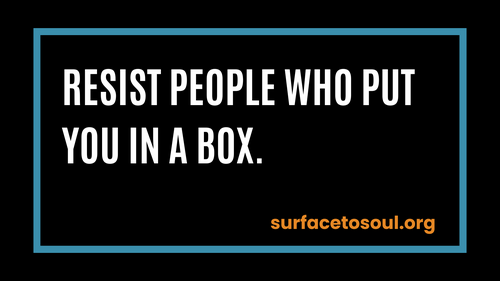
STEP 3 | Go deeper with reflecting and reimagining
1 | DO LESS
- Define your current reality.
- List what's working .
- List what's not working.
- List what's life-giving.
- List what's life-draining.
- Note your life's trajectory.
- List your purpose.
- List your passions.
- List your priorities
- List your limitations
- List what's not essential.
- List what no longer serves you.
- List what's most pressing.
- List what you'd wish to be remembered for.
2 | GO DEEPER
- Paint a picture of your future.
- List what you'll no longer tolerate.
- Connect your "whys" with your "what's.
- Rewrite your stories.
- "What if" your norms.
- Measure your influence.
- Create time/energy margins.
- Rethink your calendar.
- Rethink your finances.
- Rethink your energy.
- Rethink your relationships.
- Rethink the voices in your head.
- Decide what you'll delegate.
- Set better boundaries.
- Park ideas & opportunities.
3 | DO WHAT MATTERS
- Clarify your values.
- Embrace your superpowers.
- List competing commitments.
- Craft a rule of life.
- Design your day (new norms).
- Design your week & month.
- Design your year & decade.
- Select an annual theme.
- Add YOU to your calendar.
- Schedule deep work.
- Use a coach; find a mentor.
- Track your results & learnings.
- Embed nana habits into your life.
- Review your day/weekly goals.
- Develop your support system.
STEP 4 | Declutter your life
STEP 5 | Make a "let go" list
When people ask me what’s the most valuable resource for a church leader, my answer is always time. Take a long, hard look at your calendar. How much of what's occuping your days and weeks are tasks that don’t bring you closer to joy or your goals. Your clutter might be a signal that you need to make some changes in your circumstances to bring your work and life back into alignment. Unwanted Clutter usually reflects a glitch in your systems and serves as an indicator that something in your life is not running as smoothly as possible .
Declutter your Calendar
Decluttering your calendar involves reviewing your tasks , meetings , events , and other commitments that make us feel overscheduled .
Declutter Your Mind
Let go of the tapes you play in your head that sap your energy, steal your joy, increase your anxiety, and diminish who you are. Mental clutter inlcudes the thoughts , worries , concerns , and desires that distract us and distress us .Note what triggers these thoughts, how long you ruminate on them, and what thoughts you might replace them with.
Declutter Your Digital Life
Digital clutter is anything on our devices that overwhelms us. It includes our phones, tablets, laptops, TVs, sound systems. Note how much time you spend on your devices, how energizing these items are, how they might impact your sleep and rest patterns.
Declutter your Physical Space
Note ways that physical clutter impacts your ability to remain centered and focused. Note which items delight you, which items are used often, which items you haven't used for more than six months, and why you've chosen to store items in certain places. Take time to:
Declutter your Calendar
Decluttering your calendar involves reviewing your tasks , meetings , events , and other commitments that make us feel overscheduled .
- Make a list. Write down your passions, goals, and aspirations. This will guide you as you curate a more intentional schedule that truly honors your time.
- Look at your calendar. Identify tasks and activities scheduled in your calendar that don’t align with the passions and goals you listed earlier.
- Unsubscribe and delegate. Take a look at the tasks and activities you’ve identified. Is there any way you can unsubscribe from them or delegate them to someone else? How much time does this free up for you? If you’re a leader who spends more time replying to emails and comments than creating what you love, perhaps you can consider delegating some of these tasks to a virtual assistant.
- Redirect your time. Once you free up some time on your calendar, think about how you want to utilize that time. It’s important to be intentional as you curate your schedule. Fill these pockets of time with activities that can uplift your life and move you closer to your personal goals.
Declutter Your Mind
Let go of the tapes you play in your head that sap your energy, steal your joy, increase your anxiety, and diminish who you are. Mental clutter inlcudes the thoughts , worries , concerns , and desires that distract us and distress us .Note what triggers these thoughts, how long you ruminate on them, and what thoughts you might replace them with.
Declutter Your Digital Life
Digital clutter is anything on our devices that overwhelms us. It includes our phones, tablets, laptops, TVs, sound systems. Note how much time you spend on your devices, how energizing these items are, how they might impact your sleep and rest patterns.
Declutter your Physical Space
Note ways that physical clutter impacts your ability to remain centered and focused. Note which items delight you, which items are used often, which items you haven't used for more than six months, and why you've chosen to store items in certain places. Take time to:
- Notice when clutter begins to bother you.
- Notice how clutter makes you feel.
- Notice where clutter piles up and why.
- List what you'd like to see in place of the clutter.
- List what do you like to have more space for.
Our capacity to reimagine and reinvent our future is constrained by our self-imposed limitations. Limitations include the things we tolerate or accept in life that aren't aligned with our preferred futures. Items people we coach often accept, include:
15-Minute Exercises
- Quit prioritizing productivity over well-being. Prioritize your lives as much and you do your job.
- Quit striving to achieve work-live balance. The idea of work-life balance assumes your work life and personal life are separate . It doesn’t account for the possibility that your work life will encroach upon your personal life or that your personal life will affect your performance at the office . We simply don’t live in these silos anymore. There are aspects of our everyday routines that don’t fit neatly into either of those categories. It also doesn’t account for unforeseen situations, where equal attention to both parts of your life just aren’t possible.
- Quit taking on too many responsibilities. We need to think about how many competing commitments we can realistically manage, and which ones we may need to set aside, at least for a period of time. In music, harmony happens when two or more contrasting melodies are played together. In our everyday life, harmony happens when we integrate our personal life and work life so our days flow smoothly, where the parts of our life complement one another rather than working in opposition.
- Quit putting work first. If you're aiming for work-live harmony You are the nexus around which your life revolves. Work-life harmony helps you evaluate whether the things in your life are in sync with your priorities. We must choose activities that enhance our lives and eliminate those that don’t.
- Quit discounting what your body and gut are trying to tell you. Our bodies often tell us what’s working and what’s not working in our life. Consider what you might learn if you listen to your body and the moods you experience.
- Quit deferring your passions. We often defer the things we’re most passionate about. How might you put them into your NOW list rather than your LATER list?
- Quit ignoring ways you can use small steps and moments in your daily life to propel you toward your preferred future. Find pockets of time when I could begin to experience that harmony - while commuting, waiting for a meeting to begin, or a 10 minute walk.
15-Minute Exercises
- Make a list of things you do every week that are life-draining.
- Make a list of the things you're tolerating, that aren't part of your reimagined life, or aren't in alignment with your callings, convictions, core values, and dreams.
- Make a list of what you’ll stop doing, or do less of, to make space for what matters most to you.
STEP 6 | Participate in a MasterClass or Cohort (training slides below)
STEP 7 | Review sample road maps; then make your own
1 | Reclaim margins in life
FAITHFUL NEXT STEPS
- Acknowledge that I can't do it all.
- List/prioritize 5 things to let go of this year.
- List plans for letting go of item #1.
- Rearrange schedule to match my energy levels.
- Be home by 8:30pm most evenings.
- Help conveners plan meetings instead of attending them.
- Schedule time for quarterly Sabbath retreats.
- Schedule a night every month to connect with friends.
QUESTIONS
- What time of the day am I most creative?
- Moving forward, what will I no longer tolerate?
- who can I equip to share the ministry?
- What does self-care look like for me, right now?
- Who can support my next steps?
- What is it costing me/my family not changing?
2 | Lose 10 pounds in 6 months
FAITHFUL NEXT STEPS
- Use lunch break to go for a 30-minute walk.
- Schedule walk and talk meetings with church leaders.
- Drink a 60 ounces of water daily to stay hydrated.
- Avoiding eating during home visits, and after 7:30pm.
- Join church's Firm Believers walking group.
- Weigh self daily; celebrate weight loss milestones.
QUESTIONS
- What triggers me to eat when I'm not hungry?
- How does stress impact my eating?
- Who models healthy habits for me?
- How will I celebrate my progress?
- How can exercise be more fun?
- How does my identity influence my actions?
3 | Make time for hobbies
FAITHFUL NEXT STEPS
- Change meetings times so I can meet with small group.
- Buy tickets to 5 or more local plays, concerts, or comedy groups.
- Attend a broadway performance this year.
- Visit local wineries. Take a wine tasting course.
QUESTIONS
- Which hobbies do I enjoy doing alone?
- With hobbies do I enjoy with others?
- Who else enjoys my favorite hobbies?
- Should I start scheduling my hobbies?
4 | Take trips I've deferred for years
FAITHFUL NEXT STEPS
- Join friends in biking Wisconsin's Sparta trail.
- Rent a cottage along MN's northshore for a weekend.
- Go hiking at Joshua Tree after Leading Well Retreat.
- Tour Ring Road and Golden Circle in Iceland.
- Hike Crater Lake; drive Oregon coast with family.
QUESTIONS
- With whom do I wish to travel with?
- Which destinations do I wish to plan first?
- Which settings are most renewing?
- What would a weekend or week-long staycation look like for me?
5 | Deepen spiritual life and practices
FAITHFUL NEXT STEPS
- Schedule monthly meetings with a spiritual director.
- journal in the morning; Daily Examen at the end of the day.
- Register for the Leading Well Retreat.
- Take the Emotional Intelligence assessment.
- Use all of my Sabbath and vacation days.
QUESTIONS
- When am I most aware of God's presence?
- Which experiences/practice have been most formative for me in the past?
- Which practices will I embed into daily life?
- Who could be a spiritual mentor/guide for me?
- Which part of the day is best to reflect?
6 | Improve my home & financial settings
FAITHFUL NEXT STEPS
- Pay off car loan.
- Purchase guest bedroom furniture; wall desk for family room.
- Use up remaining Nest funds for kid's college expenses.
- Contribute maximum IRA amount to retirement plan.
- Update my monthly budget; track my net worth..
QUESTIONS
- What's my favorite room in the house?
- Which rooms energize you? Drain you?
- Where are the Sabbath place in my home?
- Which friend will I invite over more often?
- How can I make my home more inviting?
7 | Re-engage with friends and family members
FAITHFUL NEXT STEPS
- Re-engage with friends via Facebook/Instagram.
- Pilot 15 minute phone conversations with 3 friends/week.
- Explore new small group opportunities at church.
- Host/help plan family reunion event.
- Invite friends for brunch/dinner once a month).
QUESTIONS
- Which friendships do I wish to rekindle?
- Who are the people that inspire/support me?
- What's stopping me from connecting?
- What do I need most right now from my friends?
8 | Make space for fitness and outdoor activities
FAITHFUL NEXT STEPS
- Purchase annual ski pass; ski 12 or more times this year.
- Participate in a sleep study; focus on better sleeping habits.
- Average 7500 steps/day via rebounder or walking.
- Practice 1MAD and 18:6 eating routines.
- Schedule 2 camping/hiking weekend trips.
QUESTIONS
- Should I work out at home or at a gym?
- Which activities do I enjoy and keep me fit?
- Which activities could I do with my friends?
- What do I need most - rest, exercise or less stress?
- Who could be a fitness coach/mentor for me?
VIDEOS to spark new possibilities for living well
BOOKS to help you reflect, review, and reinvent life
- The 7 Habits of Highly Effective People
- The Art of Rest
- The Art of Rest: Faith to Push Pause in a World that Never Stops
- The Artist's Way: A Spiritual Path to Higher Creativity
- At Your Best
- Becoming a Life Change Artist
- Better Than Before
- Crafting a Rule of Life
- Design Your Day
- Designing Your Life
- Disrupt You!
- The Right Questions
- Sabbath: Finding Rest, Renwal, and Delight in our Busy Lives
- Sabbath as Resistance
- See Do Repeat: The Practice of Entrepreneurship
- Shift Your Thinking
- Simple Habits for Complex Times
- Start Finishing
- Start Less, Finish More
- Tending to the Holy
- The Elevation Approach
- The Unhurried Life
- Work Clean
